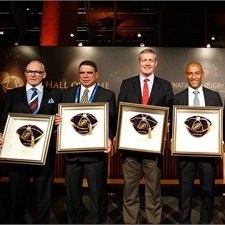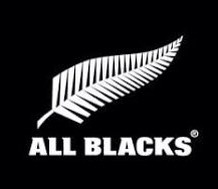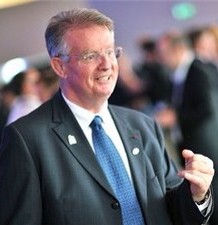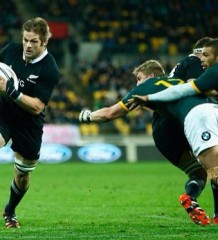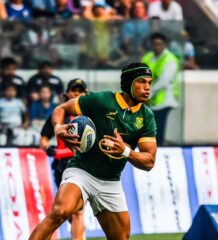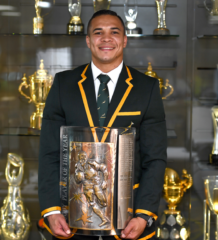Legends inducted into IRB Hall of Fame
(Picture -IRB: Ronnie Dawson, Mark Ella, Gavin Hastings and George Gregan with their Hall of Fame caps)
Eleven legends of the Game, with nearly 500 caps between them, were inducted into the IRB Hall of Fame at the Aviva Stadium in Dublin on Monday.
Staged following the conclusion of the opening day of the inaugural IRB World Rugby Conference and Exhibition, the British & Irish Lions and Australia themed ceremony attracted a number of notable guests as the global rugby community came together to celebrate past glories.
Split equally between the northern and southern hemispheres, the inductees were: Thomas Lawton Snr., John Thornett, Ken Catchpole, Mark Ella, David Campese and George Gregan from Australia, while Robert Seddon and the 1888 British team, David Bedell-Sivright, Bleddyn Williams and Jack Matthews, Ronnie Dawson and Gavin Hastings were all honoured.
Forty-eight hours after 2012 IRB Player of the Year Dan Carter (New Zealand), Gethin Jenkins (Wales) and Sergio Parisse and Martin Castrogiovanni (both Italy) won their 100th caps in their country’s respective November internationals, it was somewhat appropriate that Gregan, the most-capped player of all-time with 139 appearances to his name, was able to make it to the Irish capital to accept his accolade in person.
Campese, the other Wallaby to reach three figures after playing 101 times for his country, will receive his framed IRB Hall of Fame cap and pin at a later date back home in Australia alongside Catchpole, Thornett and Lawton, the latter posthumously.
Asides from mercurial wing Campese, the Australian contingent all captained their country with distinction at some point in their careers. Rugby World Cup 1999 winner Gregan led the Wallabies to a 2-1 Test series victory over the 2001 British & Irish Lions, while Catchpole wore the armband in nearly half his 27 Test match appearances.
Fly half Ella, the most successful of three rugby-playing brothers, became the first Aboriginal to captain Australia in any sport when he skippered the Wallabies on the 1982 tour of New Zealand. Lawton, another No.10, steered Australia to their first-ever whitewash of the All Blacks in the Bledisloe Cup campaign of 1929. Under Thornett’s captaincy in the 1960s, Australia became the first nation in 67 years to defeat South Africa in consecutive Tests – just one of many achievements during his time in charge of the team.
Brilliant individual players one and all, the Lions sextet, like their Australian counterparts, all broke the mould in one form or another; none more so than Salford-born Robert Seddon, the first-ever captain of a British Isles touring side. In 1888, a 20-strong squad, known as the ‘English footballers’ – despite fielding a combination of players from England, Scotland and Wales – set sail for New Zealand and Australia. Eight months and 53 matches later they returned home probably unaware of the legacy they were about to create.
IRB Hall of Fame panel member Gerald Davies received the award on behalf of Seddon, who tragically died while sculling during the unofficial inaugural tour. Seddon’s grave in New South Wales was visited by Davies and a number of players and coaches during the 2013 tour as an acknowledgment of the role he played in helping to establish one of sport’s most iconic teams.
On what was a busy night for Davies, the triple Grand Slam winner was also on hand to represent the all-Welsh centre partnership of Bleddyn Williams and Jack Matthews, both of whom sadly passed away in recent years. The almost telepathic understanding developed while playing together for Cardiff and Wales saw Williams and Matthews play prominent roles on the 1950 Lions tour – the first of the post-War era. Both went on to make significant contributions to Rugby at the end of their playing days too, as a commentator and Lions doctor respectively.
Flying the flag for Scotland in Dublin were inductee Hastings and IRB Council member John Jeffrey, who was present to help honour the deceased Bedell-Sivright. Bedell-Sivright captained the 1904 Lions, the first tourists, having won all 14 of their matches, to return home to the British Isles from the Australia leg unbeaten.
Hastings, meanwhile, needed little by way of an introduction as he stepped up to receive his cap. One of the greatest full backs to have played the game, ‘Big Gav’ won 61 caps, played in three Rugby World Cups and toured with the Lions, who he captained in 1993, on three occasions. Hastings scored a total of 192 points during his Lions career, of which 66 points were against Australian opposition.
To say homegrown hero Ronnie Dawson’s induction brought the roof down is probably not the best turn of phrase given his profession as an architect. However it’s true to say the Dublin-born hooker received a great reception from those present at the Aviva Stadium. The Ireland international led the Lions six times, a record since matched by Martin Johnson, and went on to serve the tourists as both a coach and selector.
IRB Chairman Bernard Lapasset said: “The IRB Hall of Fame recognises those who have made an indelible mark on our sport through feats on the field of play, displays of great character or through their tireless and inspirational work in driving forward our great Game.”
“The British & Irish Lions are an institution, a symbol of our history, our present and our future and tours to Australia have delivered bountiful unforgettable memories. These inductees, legends in their own right, have stamped their own mark on this incredible piece of Rugby history.”
The IRB Hall of Fame was launched in 2006 with the induction of Rugby School and William Webb Ellis. Since then the following legends have been inducted: Baron Pierre de Coubertin, Dr Danie Craven, Sir Wilson Whineray, Gareth Edwards, John Eales, The 1888 Natives Team and Joseph Warbrick, Ned Haig and the Melrose club, Dr Jack Kyle, Philippe Sella, Hugo Porta, William Maclagan, Barry Heatlie, Bennie Osler, Cliff Morgan, Sir Anthony O’Reilly AO, Frik du Preez, Dr. Syd Millar, Willie John McBride, Sir Ian McGeechan, Jean Prat, Lucien Mias, Andre and Guy Boniface, Serge Blanco, Harry Vassall and Alan Rotherham, Cardiff RFC and Frank Hancock, David Gallaher, Barbarian FC and WP Carpmael, Mike Gibson, Dr Roger Vanderfield, Richard Littlejohn, Sir Nicholas Shehadie, John Kendal-Carpenter, David Kirk, Sir Brian Lochore, Nick Farr-Jones, Bob Dwyer, Francois Pienaar, Kitch Christie, Rod Macqueen, Gareth Rees, Sir Clive Woodward OBE, Jonah Lomu, Jake White, Brian Lima, Agustín Pichot, Martin Johnson CBE, John Smit, Sir Gordon Tietjens, Ian & Donald Campbell, Yoshihiro Sakata, the 1924 Romanian Olympic Team, the gold medal-winning USA Olympic Team of 1920 and 1924, Richard and Kennedy Tsimba, Alfred St George Hamersley, Vladimir Ilyushin and Waisale Serevi.
Courtesy of IRB
Related Posts
« Richie McCaw returns the Webb Ellis Cup IRB awards game changers »


